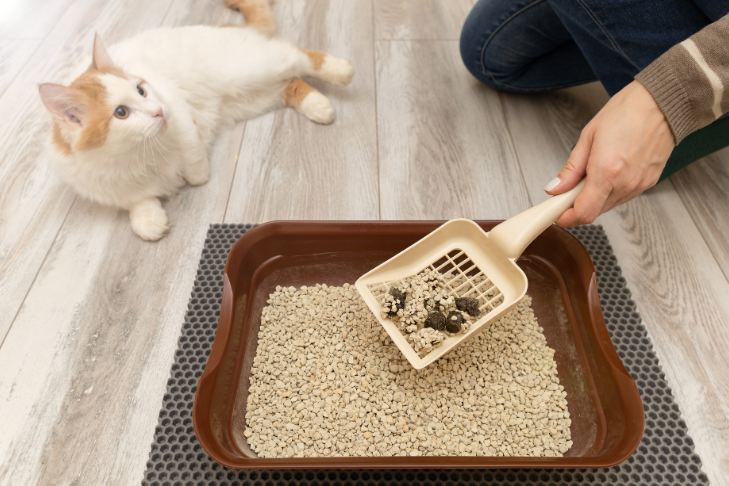How to Tell if Your Cat’s Poop Is Healthy

At Pet Releaf, we've teamed up with Dofu Cat to highlight the importance of digestive care with high-quality, limited-ingredient, and sustainably-made pet supplements and litter. Pet Releaf customers can save 20% on Dofu Cat’s 100% natural cat litter, including Odor Control Coffee and Bean Cat Litter, using the code RELEAF20.
Keeping track of your cat’s health involves more than just regular vet visits and a balanced diet. An often overlooked yet very important aspect of feline health is monitoring their litter box. Your cat’s poop can reveal a lot about their overall health and well-being. We’ll go over what constitutes healthy poop, what you can learn from your cat’s litter box, and tips for making litter box maintenance easier.
The Basics of Healthy Cat Poop
Healthy cat poop is a key indicator of your feline friend’s digestive health. Here’s what you should look for:
- Consistency Matters: Healthy cat poop should be firm but not hard. It should hold its shape but be easy to scoop. If you notice it’s too runny (diarrhea) or too hard (constipation), it could indicate dietary issues or health problems.
- Color is Key: A normal stool color ranges from light brown to dark brown. Variations in color might be linked to diet changes or health concerns. Black or red stools can be a sign of internal bleeding, while green poop may suggest a problem with the liver or gallbladder.
- Odor Observation: While all poop has a smell, an exceptionally foul odor can signal digestive problems or an infection. A subtle, unpleasant odor could also be an indication that your cat's diet needs adjustment.
- Shape and Size: Cat poop should generally be cylindrical and about the size of a small sausage. If it appears overly flat, twisted, or irregular in shape, it might be time to consult a vet.
What You Can Learn from Your Cat's Litter Box
Your cat’s litter box can reveal insights into their health and habits. Here’s what to observe:
- Frequency and Urgency: Regular pooping patterns are a good sign. Cats typically use the litter box once or twice a day. If there’s a noticeable change in frequency or urgency, it could indicate digestive issues or stress.
- Litter Box Behavior: Watch for changes in behavior around the litter box. Straining or avoiding the litter box can be a sign of constipation, urinary tract infections, or other health issues.
- Consistency of Litter: High-quality litter that controls odors and absorbs moisture effectively can help you better monitor your cat’s stool. Look for litter options that make it easier to distinguish between healthy and unhealthy stool.

Making Cleaning Your Cat’s Litter Box Easier
Cleaning the litter box doesn’t have to be a chore. Here are some tips to streamline the process:
- Choose High-Quality Litter: Opt for litter that is absorbent, controls odors well, and is easy to scoop. Clumping litter makes it easier to remove waste and maintain a clean box.
- Regular Maintenance: Scoop the litter box daily to remove waste and clumps. A full clean of the litter box with soap and water should be done weekly to prevent odors and bacteria buildup.
- Use Liner or Mat: A liner can help protect the box from stains and make cleanup easier. A mat placed under the box can catch stray litter and prevent messes.
- Proper Placement: Keep the litter box in a quiet, accessible location. Avoid placing it near food and water bowls to encourage regular use.
Optimizing Your Cat’s Digestive Health
Maintaining a healthy digestive system is key to your cat’s long-term health and overall well-being. Incorporating supplements designed to support digestive health can be extremely beneficial. Postbiotics, for example, can significantly enhance gut function by promoting a balanced microbiome, which supports healthy stool consistency and reduces occasional digestive issues.
Innovative pet health supplements like Postbiotics can strengthen immune response and support overall vitality without the potential side effects of gas and bloating associated with prebiotics and probiotics. By consistently using these supplements, you can support your cat’s digestion, improve their comfort, minimize tummy troubles, and make poop cleanup much easier.
Your cat’s litter box is more than just a place for waste—it’s a window into their health. By monitoring their poop and litter box habits, you can spot potential issues early. Using quality litter along with digestive health supplements not only makes cleanup easier but also helps keep your cat looking and feeling their best!
Shop Dofu Cat products now with 20% off using the code RELEAF20.


